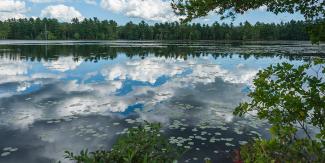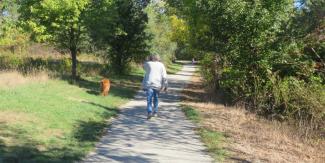Green Space Grant Opportunities

DEM’s GREEN SPACE GRANT PROGRAMS fund land conservation, recreational land acquisition and development, and recreational trail development and improvements. Each of these programs operates under a set of rules and regulations with Committee and Department oversight. The grant programs rely on State bond funding and Federal program funds. All funds require a local matching contribution which might be fulfilled with in-kind services or cash match from the grant applicant. Eligible applicants and matching fund requirements vary by program. Please review each program carefully to determine if your organization and project is eligible for funding. DEM Staff is available to guide you in this process and to help you get started.
Applications for the 2025 Supplemental Open Space Grants were due Friday, July 25, 2025.
This grant program provides up to 50% matching funds to municipalities, land trusts and non-profit conservation land organizations to preserve valuable open space throughout the state. Applications are scored by the Rhode Island Natural Heritage Preservation Commission Advisory Committee and submitted to the Natural Heritage Preservation Commission for approval. Funding for this round is provided by the voter-approved 2022 and 2018 Green Economy Bonds.
GRANT GUIDELINES:
- Applications are due by 4:00 p.m. on Friday, July 25, and must be emailed to the DEM Division of Planning & Development at dem.projects@dem.ri.gov
- Municipalities, land trusts, and nonprofit land conservation organizations are eligible to apply.
- A maximum of 50% of the approved appraised value, up to a per-project cap of $500,000, will be awarded
- The total amount of funding available is approximately $1.5 million
- Awardees are also eligible for reimbursement of up to 50% of appraisal, title, and survey costs associated with the project.
- Rules and Regulations for the Rhode Island Natural Heritage Preservation Commission
For questions or to submit an application, contact Brendan Buckless at brendan.buckless@dem.ri.gov or 401-537-4486.
The 2026 Outdoor Recreation Grant Applications were due before Tuesday, November 18, 2025, at 3 PM.
This grant program provides matching funds to cities and towns and recognized Native American tribes for the acquisition, development and renovation of outdoor recreational lands and facilities. The program is funded through State bonds. Funding categories include Large Recreation Development grants (up to 75% matching funds to a maximum of $500,000), Small Recreation Development Grants (up to 75% matching funds to a maximum of $125,000), and Recreation Acquisition grants (up to 50% matching funds to a maximum of $500,000). Scoring criteria is established by the State Comprehensive Outdoor Recreation Plan (SCORP). Applications are scored by the Recreation Resources Review Committee and submitted to the DEM Director for approval.
Funding for this round is provided by the voter-approved 2024 Green Economy Bond.
GRANT GUIDELINES:
- Municipalities and recognized Native American tribes are eligible to apply.
- Applications are due by 3:00 p.m. on Tuesday, November 18, 2025
- Email applications and all required documentation to the DEM Division of Planning & Development at lisa.mcgreavy@dem.ri.gov
- Download the appropriate application form & budget sheet for either acquisition or development grants (below).
See the Grant Instruction Sheet for more information:
Application Forms
Additional Resources
- Bond Regulations
- Statewide Comprehensive Outdoor Recreation Plan (SCORP)
- Annual Report: Outdoor Recreation Program FY2022
Previous Grant Awards
- 2024 Recreation Grant Awards (Press Release)
- 2022 Recreation Grant Awards
- 2020 Recreation Grant Awards
- 2018 Recreation Grant Awards
- 2016 Recreation Grant Awards
For questions, contact Lisa McGreavy at lisa.mcgreavy@dem.ri.gov or 401-537-4500.
The Recreational Trails Program provides financial assistance to municipalities and non-profit organizations for the development and maintenance of recreational trails and trail-related projects. This federally funded program receives its funding from a portion of federal gas taxes paid on fuel. 2021 Recreational Trail Awards funded by the Program were announced in June 2021. The next grant round is pending Rhode Island receiving allocation of funds from the Federal Highway Administration.
GRANT FORMS AND GUIDELINES:
- Rules and Regulations Governing the Recreational Trails Program (250-RICR-110-00-6)
- Federal Highway Administration Guidelines
- TAC Meeting Schedule & Minutes (In the Public Bodies search box, enter “Trails Advisory Committee)
For questions, contact Lisa McGreavy at lisa.mcgreavy@dem.ri.gov or 401-537-4500.
Frequently Asked Questions
The Recreation Trails Grant Program is funded by the United States Department of Transportation’s Federal Highway Administration. In Rhode Island, the program is administered by the Department of Environmental Management in cooperation with the RI Department of Transportation. The goal of the program is to develop and maintain recreational trails and trail-related facilities. More information about the Federal Highway Administration Recreational Trail Program
Eligible applicants include:
- Government agencies (state, local, and federal)
- Other governmental bodies created under State law (e.g. land trusts, watershed councils, public school districts, etc.)
- Federally recognized Native American tribes
- Not for profit organizations
The purpose of the program is to provide funding for recreational trail projects such as the development of new trails, improvement or restoration of existing trails, and development of trail-side and trailhead facilities and trail linkages. Ineligible activities (those not eligible for funding) include projects on trails not open to the general public, research and planning projects, and landscaping except for the purposes of erosion control, bioremediation, or re-establishment of native vegetation.
Once a new grant round is announced, application instructions will be posted on the DEM website at www.dem.ri.gov/plangrants.
The Rhode Island Trails Advisory Committee (TAC) will evaluate each application and will recommend funding for the highest scoring projects. The TAC seeks strong projects that:
- Construct off-road recreational trail connections
- Serve the diversity of Rhode Island residents
- Fill critical gaps in existing trail networks
- Have a detailed and reasonable budget and strong local match• Are ready for implementation – environmental and permitting challenges have been identified and alternatives and solutions have been fully explored
- Respond to climate change impacts and employ resiliency methods to protect the resources
- Provide access for users of all fitness levels
- Provide access for users of all ages and abilities
Allowable costs are those that are necessary for the safe and efficient completion of the project and that have been outlined in the grant application “scope of work” and approved by the Trail Advisory Committee.
It depends. If the project impacts a wetland or other area where regulations require a permit, then yes, a permit is required. A review of cultural resources and endangered species may also be required. It is the grantee’s responsibility to obtain all permits that may be required and to meet all requirements of those permits.
Permitting can be a lengthy process. In order to ensure projects are completed within the grant period, it is important that the permit process be started as early as possible. Application materials should include a reasonable timetable for all elements of the project, including permitting.
The federal share of the grant is limited to up to eighty (80) percent of total (eligible) project costs; at least twenty (20) percent of the project cost must be contributed by the grantee or other qualifying sources. This can be cash match (payment of expenses) or donations of materials and services (including volunteer labor). Only expenses in the approved scope of work are eligible for reimbursement, up to a maximum of 80% of the eligible project costs, up to the grant award.
Track expenses as you go. Grantees must follow the same policies and procedures used by state and local government. This includes obtaining quotes for purchases, invoices for materials and services, and submitting canceled checks or bank statements documenting payment. Volunteer match must be documented using sign in sheets listing the project, participants name, the task performed, as well as the number of
hours worked.
When the project is complete, submit copies of quotes, paid invoices, and proof of payment (bank statements and/or front and back of canceled checks).
The project must be completed within the Project Performance Period listed in the grant contract. Keep in mind that no work on the project may begin until the grantee has received an authorization start date.
Grantees must file status reports every 6 months.



